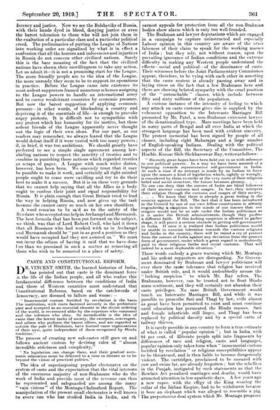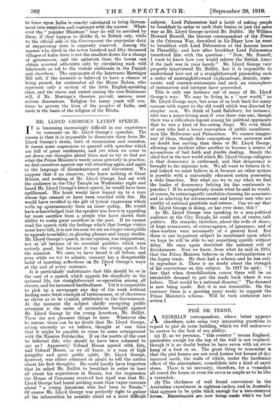CASTE AND CONSTITUTIONAL REFORM. D R. VINCENT SMITH, the learned historian
of India, .• has pointed out that caste is the dominant force :n the life of the Indian people, and all who realize this fundamental difference between the conditions of India and those of Western countries must understand that Constitutional Reforms, based on the catchwords of democracy, are doomed to failure and worse:— "Immemorial custom fortified by revelation is the basis The institution, with roots fastened securely in the prehistoric past and accepted as an essential element in the divine ordering of the world, is reverenced alike by the superiors who command and the inferiors who obey. So ineradicable is the idea of caste that'the lowest ranks of society, the sweepers, scavengers, and others who perform the basest offices, and are regarded as outside the pale of Hinduism, have formed caste organizations of their own, quite independent of those recognized by Hindu tradition."
The process of creating new sub-castes still goes on and follows ancient custom by devising rules of " almost incredible strictness and complexity."
" No legislation can change them, and their gradual auto- matic relaxation must be deferred to a time so distant as to be beyond the vision of practical politics."
The idea of superimposing popular electorates on the system of caste and the expectation that the vital interests of the enormous majority of non-Brahmans who do the work of India and provide most of the revenue can thus be represented and safeguarded are among the many " vain visions " of the Montagu-Chelmsford Report. The manipulation of the present small electorates is well known to every one who has studied India in India. and th earnest -appeals for protection from all the non-Brahman bodies show alarm which is only too well-founded.
The Brahman and lawyer deputations which are engaged in a campaign to capture uninstructed and especially Labour opinion in this country are aware of the utter falseness of their claim to speak for the working masses of India ; but they rely, not without reason, upon the prevailing ignorance of Indian conditions and the extreme difficulty in making any Western people understand the effects—social and political—of the dominance of caste. Their witnesses before the Joint Parliamentary Commission appear, therefore, to be vying with each other in asserting that the caste system is already passing away and in laying stress on the fact that a few Brahmans here and there are showing belated sympathy with the cruel position of the " untouchable " classes, which include between fifty and sixty millions of the population. A curious instance of the intensity of feeling to which any attack on caste customs gives rise is supplied by the vehement opposition to the Intercaste Marriages Bill promoted by Mr. Patel, a non-Brahman extremist lawyer of the denationalized type. Mass meetings have been held in many- parts of Bengal and all over India at which the strongest language has been used with evident sincerity. The protest memorial has been signed by people of all classes, including eight Maharajas and a large number of English-speaking Indians. Dealing with the political aspects of the Bill, the Secretary of the Committee, The Honble. Kumar Shib Shekhareswar Ray, writes as follows :- " Recently great hopes have been held out to us with reference to our political powers. In a way we have been assured of a beginning towards representative self-government in India. At such a time if an attempt is made by an Indian to force upon the masses a kind of legislation which, rightly or wrongly, is considered by them to strike at the very roots of their religious belief and social structure, the future becomes gloomy. . . . No one can deny that the masses of India are blind followers of their ancient customs and usages. In fact, they interpret their religion through the customs and usages of their society. . . . We know that there is already a great feeling in the country against the Bill. The fact that it has been introduced in the Council by one of our own fellow-countrymen is already engendering a suspicion in the minds of our masses that our religion would not be so safe under the Indian politicians as it is under the British administrators, though they profess a different faith. If this lurking suspicion is allowed to gather shape, it will prove a serious obstacle in getting self-government in India. If once it is realized that Indian politicians would he unable to exercise toleration towards the various religions and faiths in the country, there will be raised a cry of protest from the masses of India against any deviation from the present form of government, under which a great regard is undoubtedly paid to their religious faiths and social customs. That will indeed be a most deplorable situation."
These words embody a grave warning which Mr. Montagu and his ardent supporters are disregarding. No Govern- ment dominated by Brahman and lawyer politicians will ever show the same tolerance that religion has received under British rule,- and it would. undoubtedly arouse the "lurking suspicion " to which Mr. Ray refers. The Brahmans, however, can be trusted not to flout Hindu mass sentiment, and they will certainly not abandon their caste privileges. No sane British Government would touch an Intercaste Marriages Bill, and while it was possible to proscribe Sati and Thagi by law, evils almost as great have been permitted to exist and must continue until education has permeated the Hindu masses. Sati and female infanticide still linger, and Thagi has been replaced by political dacoity and by a special caste of railway thieves.
It is rarely possible in any country to form a true estimate of what is called " popular opinion " ; but in India, with 94 per cent. of illiterate people split into fragments by differences of race and religion, caste and languages, popular opinion only takes form when " immemorial custom fortified by revelation " or religious susceptibilities appear to be threatened, and is then liable to become dangerously violent. The cartridges, proclaimed to be smeared with cow and swine fat, are already forgotten ; but the rebellion in the Punjab, instigated by such statements as that time Rowlatt Act penalized marriages and deaths, would have attracted attention in less apathetic days. A few years ago a new rupee, with the effigy of the King wearing the collar of the Indian Empire, had to be withdrawn because it bore an elephant which was alleged to resemble a pig. The preposterous dual system which Mr. Montagu proposes' to force upon India is exactly, calculated to bring Govern- ment into suspicion and contempt with' the masses. What- ever the•" popular• Ministers" may do will be ascribed by them, if they happen to dislike it, to British rule, while to the official side• of the Government the ,unpopular duty of suppressing riots is expressly reserved. Among the masses who dwell in the seven hundred and fifty thousand villages of India there is not the smallest desire for a change of government, and the agitators from the towns can obtain nominal adherents only by circulating such wild falsehoods as led to the violent outbreaks in the Punjab and elsewhere. The opponents of the Intercaste Marriages Bill -will, if the measure is believed to have a chance of being passed, far outnumber all the Home Rulers, who represent only a section of the little English-speaking class, and the alarm and unrest among the non-Brahmans will, if Mr. Montagu's theories prevail, assume most serious dimensions. Religion for many years will con- tinue to govern the lives of the peoples of India, and caste is the basis of the religion of the Hindu.







































 Previous page
Previous page